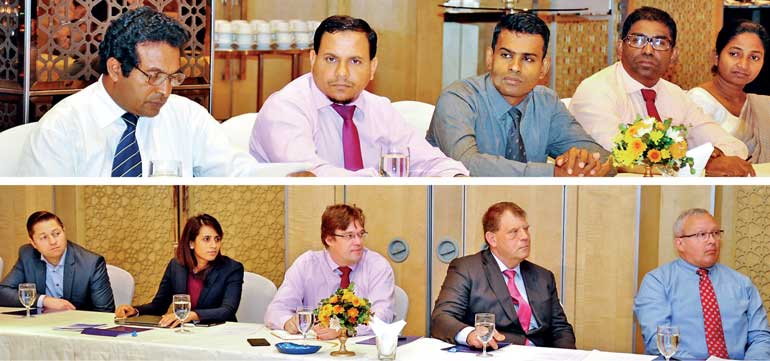Friday Feb 13, 2026
Friday Feb 13, 2026
Friday, 17 November 2017 00:00 - - {{hitsCtrl.values.hits}}


By Charumini de Silva
The first-ever public private partnership (PPP) simulation exercise organised by the USAID Short-Term Assistance to Improve Public Financial Management Reform (STAIR) project, in collaboration with the Embassy of the Netherlands and the Department of Public Finance of the Ministry of Finance, kicked off yesterday in Colombo. With traditional sources of funding often falling short of investment needs and governments all over the world exploring innovative models to meet the growing demand to finance essential infrastructure projects, USAID Sri Lanka Assistant Mission Director Elizabeth Davnie-Easton said Sri Lanka too has found a PPP model as the way forward to deliver essential public services.
“Recognising the benefits of PPP models, the Sri Lankan Government is currently in the process of lodging a number of PPPs to implement infrastructure projects, delivering public services that will contribute to the growth of the economy,” she added.
Pointing out that across the world USAID has worked with various stakeholders to plan, build and support sustainable PPP models, she asserted that they were proud to support the Sri Lankan Government through expert-led training programs and the introduction of new technologies such as the electronic government procurement system (EGPS).
“I believe the EGPS is being discussed by the Cabinet right now. This is a more cost-effective and convenient way of doing procurements while it also makes Government processes more transparent and accountable to their people,” said Davnie-Easton.
She noted that governments were harnessing the assets and the experiences of strategic partners, including the private sector, by leveraging their experience and investment in creativity to better deliver essential public services and thereby boost economic and social progress.
Acknowledging that the innovative and interactive software being used at the simulation exercise was provided by the Dutch Government, she said they were pleased to be a partner in this project. The World Economic Forum rated the Government of the Netherlands the second best country with regards to infrastructure.Delivering the keynote address, Dutch Ambassador in Sri Lanka Joanne Doornewaard said that with Sri Lanka becoming a middle-income country, they had shifted their program from aid to trade.
“Our cooperation with Sri Lanka is strong in many subjects, water and agriculture being two of them. The G2G cooperation on PPPs is not only aimed at making the ferry service successful but we also see it as a mutual transfer of knowledge, experience and friendship,” she added.
According to her, the Government of the Netherlands is partnering the development of a PPP ferry service in Colombo where they have close cooperation with the Megapolis and Western Region Development Ministry, Land Reclamation and Development Corporation, Finance Ministry and Sri Lankan private sector. The Ambassador said Sri Lanka and the Netherlands had a long history, the traces of which could be seen through structures like the Galle and Trincomalee forts.
“As much as we like to share our knowledge on PPP, as Dutch we like to do things differently. We like to use innovative ways for training. You will not see long presentations and PowerPoints but it will be much more dynamic. You will learn by playing the simulation game,” she quipped. It was also described as a unique occasion where the Netherlands and USAID will join forces to assist Sri Lanka build PPP capacity. Given the Budget constraints Sri Lanka is faced with at present, the Finance Ministry’s Department of Public Finance Director General P. Algama said PPP would be the solution to face the challenge of providing basic infrastructure facilities and other essential public services. “We are meeting today, while other important reforms are also taking place at the same time including the Public Finance Management Bill, electronic government procurement system and so on,” he added.
During the past one and half years the Public Finance Department of the Ministry of Finance and the USAID/STAIR project jointly organised a series of workshops to educate participants and later asked for comments and suggestions for the revised PPP guidelines.
“The draft guidelines were referred to many stakeholders for comments and now we are in the process of finalising the guidelines with the valuable ideas, views, comments and thoughts we receive from all the stakeholders. Today we have the opportunity to test the knowledge we gained through the series of workshops and apply it in virtual situations to see whether our public procurement guidelines will work in practical situations,” Algama stressed. USAID/STAIR project Chief of Party Thomas Burola said the simulation exercise was for the first time being introduced to a South Asian country. “I almost feel like it is my first day on the job to try out this new experience. We have heard of simulation exercises for pilot training but not for training public and private officials involved in PPPs. We have created history by bringing a brand new technology to this part of the world with the support of the Government of Netherlands,” he told the Daily FT. Burola added that this was one of many workshops they were planning to conduct using the same technology in the future.
Pix by Lasantha Kumara